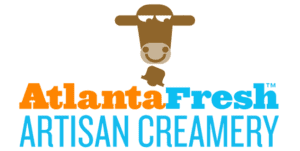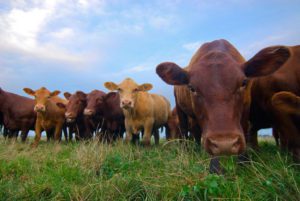An economy genuinely local and neighborly offers to localities a measure of security that they cannot derive from a national or a global economy controlled by people who, by principle, have no local commitment.
-Wendell Berry
You may have noticed a few less options when it came time to customize your delivery basket this week. In particular, you’ll find that the locally sourced and grass-fed cream and yogurt from AtlantaFresh Creamery is no longer available on our site. Or anywhere, for that matter. Because they are officially going out of business.
As Supplier Relations Manager here at FH, I can tell you that it’s no easy task to find a replacement for such a unique and valuable vendor. Environmentally thoughtful creameries with delicious products are a diamond in the rough. It got me wondering, “What went wrong?” So I called up Ron Marks, founder and owner of AtlantaFresh, to ask what happened. In a nutshell, Marks told me, “We went from a 17 million dollar company to a one million dollar company overnight.”
AtlantaFresh was birthed in 2009, and within months Marks gladly adopted Whole Foods as his largest customer. At the time, Whole Foods was all about extending support to local food producers and increasing their footprint within the hyper-local market. They created a low-interest loan program, which allowed vendors to expand through capital investments and designated contracts. In 2016, AtlantaFresh agreed to a loan of half a million dollars and a seven year contract to supply 130 Whole Foods stores with 30 thousand gallons of milk each week. About a year later, Amazon made its historical purchase of the grocery chain and everything changed.
Amazon quickly purged most of the Whole Foods middle management and cut ties with local artisans who did not fit their profitability model. Within a couple months of the acquisition, the newly owned Whole Foods backed out of the agreement with AtlantaFresh, leaving them with a mountain of overhead costs and no revenue. “As I look back, because of that relationship, we never felt we had to put in any efforts towards sales or marketing. We never really diversified; they bought everything. They knew they’d put us out of business and it didn’t stop them,” said Marks over the phone.
Just like you would see in a natural ecosystem, the loss of such an important player has downstream effects. AtlantaFresh was forced to lay off 32 employees when the doors closed. Additionally, many other small local Atlanta vendors are seeing the repercussions of AtlantaFresh’s demise. Locally-minded companies like Banner Butter purchased their ingredients from the creamery and are now forced to turn to other suppliers.
Marks told me, “The farmer, is really hurting now too.” Partially as a result of the Whole Foods contract with AtlantaFresh, Newberry Farm in Waynesboro, Georgia converted its entire herd of cows from conventional farming methods to become a much more expensive non-GMO and grass-fed certified operation. While this method of farming is much better for the environment and consumers, dedicating an entire farm to supply one client is difficult to bounce back from when that client goes away. When Whole Foods backed out, Newberry Farm was also forced out of business.
I called up my friend, the owner of a local jarred goods company and supplier of Fresh Harvest and Whole Foods, to get his take on how Amazon has changed things. Under all new management, Whole Foods has drastically decreased its emphasis on working directly with local businesses, and has instead shifted the focus to hyper-efficiency. He told me, “They are definitely trying to get rid of allowing independents to come to the store to sell.” Instead they are beginning to require deliveries to come through select distributors, who often take up to 40% of the total invoice amount as payment. He mentioned that, “It would have to lower our quality over time to lose so much to distribution.”
According to this 2017 Wall Street Journal Article, organic food degradation in America is already happening. We are currently seeing a flood of low quality foreign organics pouring into our markets. You can bet that the buyers of this type of food are primarily focused on efficiency and profit. And for many consumers, these cheaper “healthy” options have set the new acceptable bar.
For others, it’s easy to feel helpless in the midst of monumental multi-billion dollar business transactions between global companies. But where do you sit in all of this, thoughtful Fresh Harvest customer? If this is a food chain (and it is), YOU are the apex predator. You tell the Fresh Harvest’s, the Whole Food’s, the AtlantaFresh’s, and even the Amazon’s of the world what you want. And we listen! No company is going to force you to buy anything. So it’s up to you to shout your ethics from the rooftops. We all have to decide in this one life what we value most. How do your food choices reflect that?


